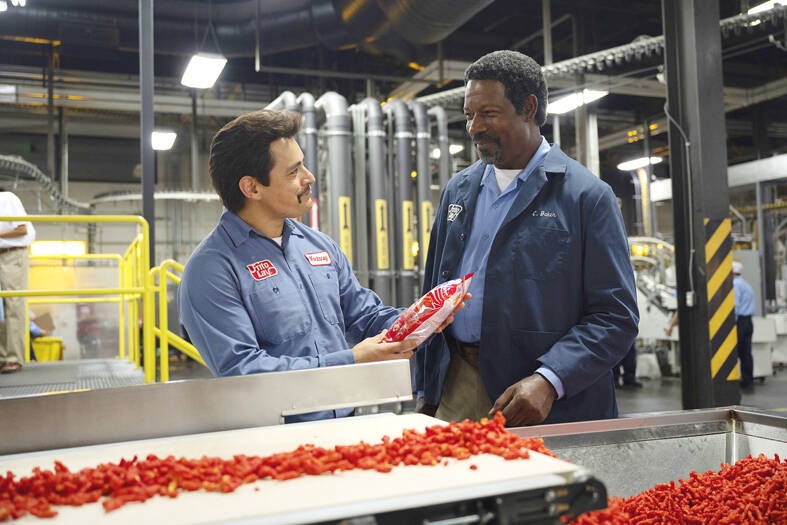Flamin’ Hot Cheetos get an origin story worthy of any Marvel superhero with Hulu’s totally engrossing Flamin’ Hot. It’s the tale of how a struggling Mexican American janitor came up with the idea of adding spice to the cornmeal, forever saving after-school snacking.
Is it true? Probably not. Don’t let that stop you.
You’ll wish Flamin’ Hot was accurate because it’s a winning tale of perseverance, family love, proud heritage and blue-collar success, told with a wink, some Cheetos dust and a ton of love by Eva Longoria, in her directorial debut.

Photo: AP
Jesse Garcia stars as Richard Montanez, a one-time Frito-Lay floor-sweeper in southern California who convinced his bosses to make a snack that celebrates the flavors of Mexico despite a seven-layer dip of skeptics.
“New products take years to develop, cost millions to launch and they do not get created by blue-collar hoodlums, who probably can’t spell hoodlum,” our hero is told.
Nevertheless, Montanez persists, cracking the Latino market and repairing his relationship with his abusive father along the way.

Photo: AP
“I’m the guy who helped bring the world the most popular snack it’s ever seen,” he says in a voice-over.
It’s an unlikely story, for sure. No, really. It’s unlikely. The Los Angeles Times has published allegations that Montanez fabricated his role in the snack’s creation and Frito-Lay says he “was not involved.”
But Longoria and the screenplay by Lewis Colick and Linda Yvette Chavez — based on Montanez memoir — will have you cheering when the gnarled red snacks finally zip along on an assembly line and you’ll be ready to gleefully fist-bump Montanez, played understatedly but with deep soul by Garcia.
This is more than just a snack-version Rocky story, with the filmmakers exploring the insecurity of factory shift workers, the stress of integrating into white culture, how hard it is for corporations to innovate and the ability to silence the voices in your head that urge you to quit.
In one heartbreaking early scene, Montanez — so poor he waters down the milk for his kids and uses chewing gum to seal holes in their shoes — is wide-eyed at the Frito-Lay factory until he notices all the overcooked chips are tossed.
“People are always trying to throw away the brown ones,” he says.
The filmmakers enliven their story with wonderful flights of fancy, like when we see Montanez lose it and beat up a manager with a mop after being called Paco.
“Nah, just kidding,” he says in the voice over. “What you think? It was my first week on the job.”
To show the passage of time during the Reagan administration, they’ve also cleverly got a man on the factory floor holding a box reading “1985,” the extruder pumps out “1986” and forklifts carrying boxes that read “1987” and “1988.”
There are a few references to Frito-Lay scientists in the Midwest also working on a spicy flavor, but this is strictly a fist-in-the-air portrayal of Montanez alone, set to a soundtrack of Latin artists like Santana, Los Lobos and Ozomatli.
His heroic arc is more than a little unbelievable, especially when he taps his former drug-dealing pals to start handing out free bags of chips like pushers, and for the many times he jumps up on a piece of factory equipment to deliver a Dead Poets Society-like speech.
Dennis Haysbert as a gruff engineer, Annie Gonzalez as Montanez’s loving wife and Tony Shalhoub as the CEO of Frito-Lay all add welcome flavor notes.
It’s the montages that really shine, like the moment in a park when Montanez, eating elote and watching everyone put hot sauce on their food, gets a vision of a spicy snack.
“I had been searching for an answer. Or a door to open. And there it was all around me. It had been there the entire time,” he says.
There’s also the sequence when he and his family try every chile combo — poblano, pasilla, serrano, guajillo and habanero included — until they find the right formula, often hovering around their youngest kid as he samples a chip and gives them the green light.
The final product is credited with opening the door to cool new convenience store flavors and for US corporations to finally respect the Latino market. That’s a lot of stuff to put in a bag of chips, even if it’s all made up. But it’s so fun to watch. It burns so good.

On April 26, The Lancet published a letter from two doctors at Taichung-based China Medical University Hospital (CMUH) warning that “Taiwan’s Health Care System is on the Brink of Collapse.” The authors said that “Years of policy inaction and mismanagement of resources have led to the National Health Insurance system operating under unsustainable conditions.” The pushback was immediate. Errors in the paper were quickly identified and publicized, to discredit the authors (the hospital apologized). CNA reported that CMUH said the letter described Taiwan in 2021 as having 62 nurses per 10,000 people, when the correct number was 78 nurses per 10,000

As we live longer, our risk of cognitive impairment is increasing. How can we delay the onset of symptoms? Do we have to give up every indulgence or can small changes make a difference? We asked neurologists for tips on how to keep our brains healthy for life. TAKE CARE OF YOUR HEALTH “All of the sensible things that apply to bodily health apply to brain health,” says Suzanne O’Sullivan, a consultant in neurology at the National Hospital for Neurology and Neurosurgery in London, and the author of The Age of Diagnosis. “When you’re 20, you can get away with absolute

May 5 to May 11 What started out as friction between Taiwanese students at Taichung First High School and a Japanese head cook escalated dramatically over the first two weeks of May 1927. It began on April 30 when the cook’s wife knew that lotus starch used in that night’s dinner had rat feces in it, but failed to inform staff until the meal was already prepared. The students believed that her silence was intentional, and filed a complaint. The school’s Japanese administrators sided with the cook’s family, dismissing the students as troublemakers and clamping down on their freedoms — with

As Donald Trump’s executive order in March led to the shuttering of Voice of America (VOA) — the global broadcaster whose roots date back to the fight against Nazi propaganda — he quickly attracted support from figures not used to aligning themselves with any US administration. Trump had ordered the US Agency for Global Media, the federal agency that funds VOA and other groups promoting independent journalism overseas, to be “eliminated to the maximum extent consistent with applicable law.” The decision suddenly halted programming in 49 languages to more than 425 million people. In Moscow, Margarita Simonyan, the hardline editor-in-chief of the